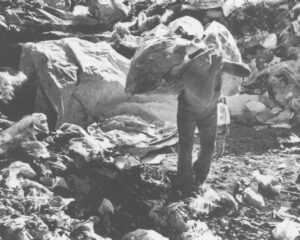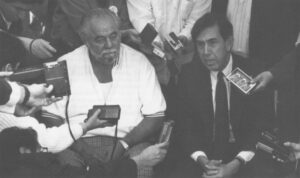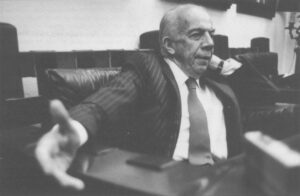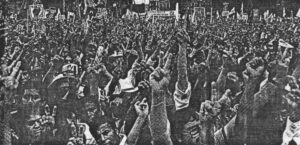Suzanne Bilello
- 1988

Fellowship Title:
- The Legacy of 1968 In Mexico's Political Future
Fellowship Year:
- 1988

The Economic Chaos In Mexico: A Primer
MEXICO CITY–Augustina Cruz lives in the western fringe of Mexico City in a one-room ramshackle house built of broken boards and cartons and a rusty strip of metal for a roof. Each morning Cruz, 45, a widowed mother of five, walks the short distance to the Santa Fe garbage dump where she and hundreds of others pick through the city’s residue, scrounging for glass, paper, cardboard and a myriad of assorted metal and wire to sell for fractions of a penny per pound. On a good day she makes about $4. Augustina Cruz, 45, and her daughter earn a living scrounging for saleable refuse in Mexico. (Photo by Damian Dovarganes) Below the dusty hillside where Cruz lives, the Iberoamericano University sprawls. The low red brick buildings comprise one of the most elite institutions of higher education in Mexico. Nearby, another bastion of prosperity; the walled-in complex where former President Jose Lopez Portillo and his family live. The estate is popularly known as “dog hill” a reference to the former president’s ill-timed vow to defend the

The Opposition Struggles In Mexico
MEXICO CITY-In the wake of last July’s controversial presidential election, center-left opposition leader Cuauhtemoc Cardenas could readily muster 200,000 supporters to fill Mexico City’s central plaza to rally against the ruling party. But as the memory of irregularities and fraud charges stemming from the July 6 election faded, Cardenas and his followers drew substantially smaller crowds and shifted their strategy away from protests to the difficult task of ordering their own political house. In an attempt to unite under one umbrella the numerous political factions that supported his unsuccessful presidential bid, Cardenas is trying to form a new political party. In the chilly days before Christmas, Manuel J. Clouthier, center-right National Action Party, PAN, candidate for president launched a brief hunger strike to protest charges of fraud in state elections in December. Manuel J. Clouthier and Cuauhtemoc Cardenas meet the press. (Fernan Rodriguez C.) The corpulent Clouthier held a vigil that bordered on the melodramatic in a tent pitched near the Monument to Independence on Avenida Reforma in the center of the capital. Since July,

The Fragile Peace
For most of his adult life Samuel I. del Villar, a former Mexican government official and prominent intellectual, was a member in good standing of Mexico’s ruling Institutional Revolutionary Party, PRI, and a staunch defender of the one-party system. But in the aftermath of the controversial July 6 presidential and subsequent state elections, del Villar, who coordinated an anti-corruption program under former President Miguel de la Madrid, decided to resign from the party he had been a member of for 25 years. In an acerbic letter of resignation last November, del Villar summed up his opinion of the PRI. “In fact the PRI has converted into the party of imposition and social injustice, totally corrupting its standard of democracy and social justice,” he said. In the oil-rich state of Tabasco, site of controversial state elections last November, Jorge Rodriguez Hernandez, a 34-year-old petroleum worker was also, until recently, a supporter of the PRI. Rodriguez and several dissident workers at a Pemex, the state oil monopoly installation in Cuidad Pemex, said they broke with tradition and

The Massacre in Mexico – Twenty Years Later
Editors Note: APF Reporter Vol.11 #3 exsisted only as a photo copy, becuase of this the pictures in this story are of poor quality. MEXICO CITY–On the eve of the 1968 Olympics, a helicopter hovered over the colonial Santiago church in Tlatelolco, the Plaza of the Three Cultures in central Mexico City. Shortly after 6 p.m., a Bengal flare dropped. Hundreds of troops emerged from behind austere Pre-hispanic ruins and opened fire with automatic weapons on the defenseless crowd of more than 10,000 people gathered for yet another protest against the authoritarian government of President Gustavo Diaz Ordaz. Many were students whose political sympathies ranged from liberal to leftist. Since late July they had taken to the streets to pressure the government for basic political reforms. A squad of plainclothes soldiers, each wearing a white glove on his left hand and a revolver in his right, converged on the third floor balcony of the Chihuahua apartment building where student leaders had addressed the crowd. They ordered the students to the floor, witnesses say, and
